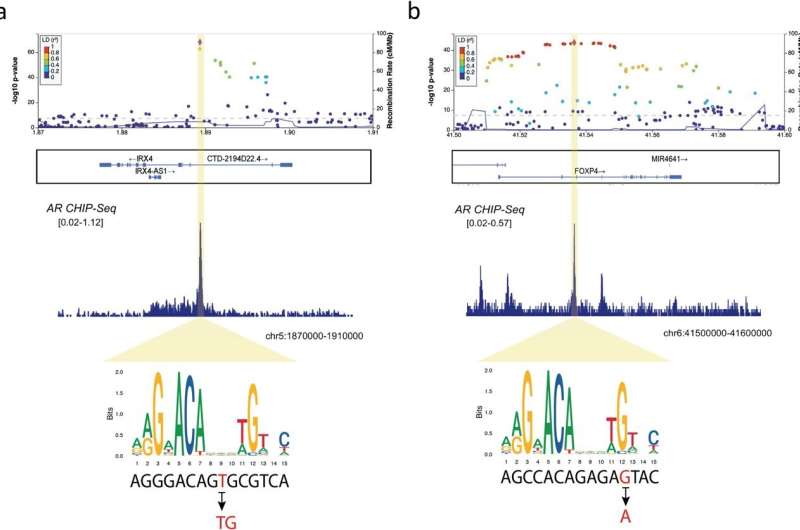This article has been reviewed according to Science X's editorial process and policies. Editors have highlighted the following attributes while ensuring the content's credibility:
fact-checked
peer-reviewed publication
trusted source
proofread
Massive genetic study estimates the chance of dying from prostate cancer

Just by looking at a short portion of a man's genome it is possible to estimate the probability that he will die from prostate cancer—even before he has the cancer—thanks to a massive genetic study by RIKEN researchers. This ability will help pick up the cancer early in men who have a high risk of dying from it.
Prostate cancer is the second most common cancer in men globally. It also has the highest heritability among all common, non-skin cancers, indicating that a man's genetics plays a large role in whether he will get the cancer. That makes it a prime candidate for genetic studies.
It is difficult to untangle cause and effect in many studies. "The standard approach involves comparing samples taken from patients and from healthy people," says Chikashi Terao of the RIKEN Center for Integrative Medical Sciences. "But since samples are obtained from patients after they develop the disease, any differences between proteins or genes could be due to the presence of the disease."
That is where genetic studies of inherited gene variants come into their own. "If we discover differences in variants between people with prostate cancer and healthy people, they should be the causes not the consequences, because those inherited variants should be different between the two groups even before developing the disease," explains Terao.
Now, Terao and colleagues have applied the power of genetic studies to prostate cancer in a study involving data from 300,000 people. The findings are published in the journal Nature Communications.
The team focused on sites that bind the male hormone androgen since a preliminary analysis revealed that variants of those sites played a dominant role in prostate cancer. They also assessed the risk of dying from prostate cancer rather than the risk of getting the disease.
The results obtained indicated that the polygenic risk score developed in the study can be used to predict future risk of dying from prostate cancer.
Furthermore, they showed that the androgen-receptor-binding regions of normal prostate cells are particularly effective in predicting this. "We found about 40% of the heritability of prostate cancer can be traced to the 1% of the genome that codes for the androgen-receptor binding site of the normal prostate," says Terao.
Unlike many previous studies that focused on people of European origin, the study used data from Japanese people. "This enrichment was observed in both Japanese and Europeans, suggesting that the current findings can be generalized," notes Terao.
The study findings will help to identify people at high risk early in life, who can then take examinations more frequently throughout their lives.
More information: Shuji Ito et al, Androgen receptor binding sites enabling genetic prediction of mortality due to prostate cancer in cancer-free subjects, Nature Communications (2023). DOI: 10.1038/s41467-023-39858-8
















